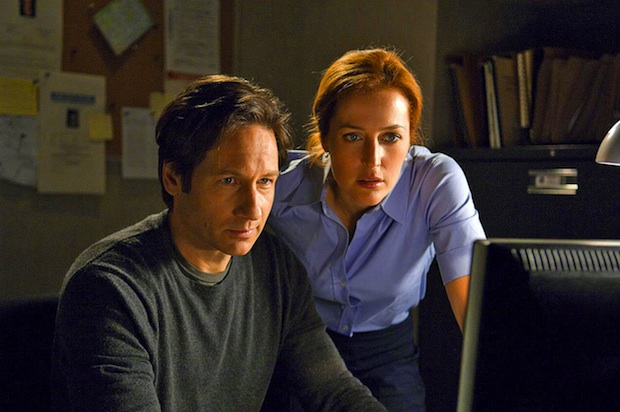The X-Files is returning to TV for a six-part “event,” and even if you’re like me (and have never seen a single episode of the hugely popular 1993-2002 series), its return raises some interesting questions. No, this is not me going all Fox Mulder on you and stirring the pot on some new conspiracy theory. And yes, I know who the show’s Scully and Mulder characters are, even though I never saw the show. I don’t live under a rock!
The most serious question it raises for me, and for Public Radio International’s Elizabeth Shockman and Studio 360’s Eric Molinsky and Kurt Anderson as well, is why Americans love the kind of conspiracy theories that fuel X-Files plots. You may be saying, Hey, I don’t love conspiracy thinking, so leave me out of this! Well, you and I may not be fans of such thinking, but the popularity of the show, and other similar pop culture trends, prove that we’re not necessarily the majority.
There are many folks out there that do love thinking about conspiracy theories, so something is up. The question is what.
I believe it comes down to the fact that most people want tidy answers to the most complex and disturbing questions. In fact, for many folks, that’s when they want those answers most; conspiracy theories answer that need. In that regard, we’re all in this together: Whether we like conspiracy theories or not, most of us want answers to life’s questions.
We yearn for closure when our worlds seem to be blowing open faster than we can comprehend – often violently and/or tragically so. September 11? Must have been a conspiracy – take your pick among many theories. Rising cases of autism? Must be a conspiracy related to vaccines. Don’t like President Obama? Must be a conspiracy to cover up his “true” religion or place of birth.
Only, none of that is true!
Conspiracy theories thrive not because they’re accurate, but because it’s not easy to live with a tragic or undesirable outcome. Yet we want to keep going, and need to put the pain of unanswered questions someplace. Enter the conspiracy theory. So if that logic is correct, and I believe it is, where does that leave us?
As weird as it may seem, especially to those of us who aren’t big on conspiracy theories, it means we can stop debating the particulars with those who are drawn to think that way, and respond instead to the pain or frustration fueling their thought process. Anything less is like seeing someone screaming frantically and telling them, “Calm down.” We know how well that works, right?
It’s not easy to do – believe me when I tell you, I know – but remember that the reasons we love conspiracy theories are as real and as deeply human as the theories are false and outrageous. That being the case, we need to see these theories for what they are, and respond to those who love them, not debate the “facts” of them. Of course, when it comes to The X-Files, we may just want to love them – both the theories and the show.
Image credit: Fox

Brad Hirschfield is the co-founder and co-executive editor of The Wisdom Daily. A rabbi, Brad has been featured on ABC’s Nightline UpClose, PBS’s Frontline, Fox News and National Public Radio. He wrote a long-standing column, “For God’s Sake,” for the Washington Post, and has also written for The Huffington Post and Beliefnet.com. He authored the book, You Don?t Have To Be Wrong For Me To Be Right: Finding Faith Without Fanaticism. Brad also serves as President of Clal, The National Jewish Center for Learning and Leadership, a leadership training institute, think tank and resource center in New York City.

